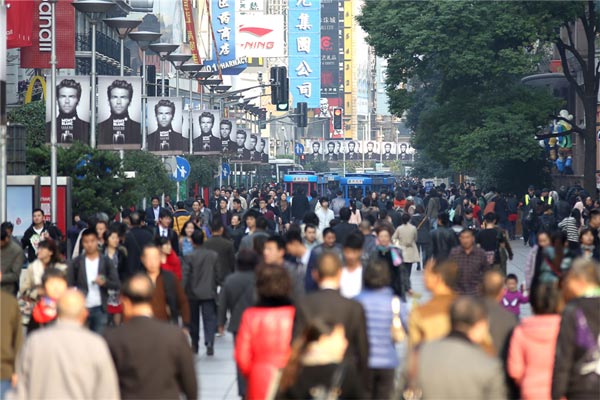 |
| The Nanjing Road Pedestrian Mall in downtown Shanghai is packed with shoppers and sightseers yesterday. The city’s public security bureau said the local population had exceeded 25 million by the end of October, including more than 10 million from outside the city. — Xinhua |
From next year, Shanghai is to stop allowing professionals from other provinces on the mainland to be included in the collective residency at city and district-based talent service centers, student affairs centers and employment agencies.
The system was established in the 1990s to help professionals outside Shanghai to settle in the city and enjoy the same welfare benefits as residents though they did not have hukou, or registered residency.
After the scheme ends, those needing hukou for, for instance, going abroad or enrolling children in schools can obtain a residency certificate from the police.
The surging number of people registered in the tailored collective residency has overwhelmed public services at these centers, the Shanghai Public Security Bureau said.
The latest move aims to relieve the burden and divert holders of collective residency to community services.
People involved are now encouraged to buy homes or move their residency to that of their spouse, direct relatives or employer’s collective residency and the rest to move to the public residency at their communities.
Those unwilling to move their residency documents or with whom contact has been lost will be included in a controlled list of people who will be refused all residency-related issues and applications for going abroad from June 30 next year.
Once gaining approval from Shanghai’s personnel and education authorities to move to the city, professionals can register at the public residency of the community where they live if they have no spouse, direct relative, real estate or if their employer has no collective residency in Shanghai.
The qualifications of those included in the public residency at their community must be monitored by the police and talent management departments, the bureau said, in a bid to improve administration of professionals from other parts of China.
From now to the end of the year, all talent service facilities must carry out checks of each residency holder’s marriage, real estate, employment and tax status.
The bureau said that by last month, Shanghai’s population had exceeded 25 million, including some 10 million people from other provinces.
 Luxury-cars parade held in Dubai
Luxury-cars parade held in Dubai Special forces take tough training sessions
Special forces take tough training sessions Fire guts 22-storey Nigeria commercial building in Lagos
Fire guts 22-storey Nigeria commercial building in Lagos Singles Day:
Singles Day:  Temperature drops dramatically in Beijing
Temperature drops dramatically in Beijing Typhoon Haiyan hits south China's Hainan
Typhoon Haiyan hits south China's Hainan Top 10 celebrity moms in China
Top 10 celebrity moms in China Weekly Sports Photos:
Weekly Sports Photos: Gingko leaves turn brilliant golden yellow in Beijing
Gingko leaves turn brilliant golden yellow in Beijing Maritime counter-terrorism drill
Maritime counter-terrorism drill Love searching stories in cities
Love searching stories in cities Male belly dancer in women’s fitness club
Male belly dancer in women’s fitness club  15 best rivers for travelers in world
15 best rivers for travelers in world National Geographic Traveler Photo Contest
National Geographic Traveler Photo Contest Weekly Sports Photos
Weekly Sports PhotosDay|Week|Month